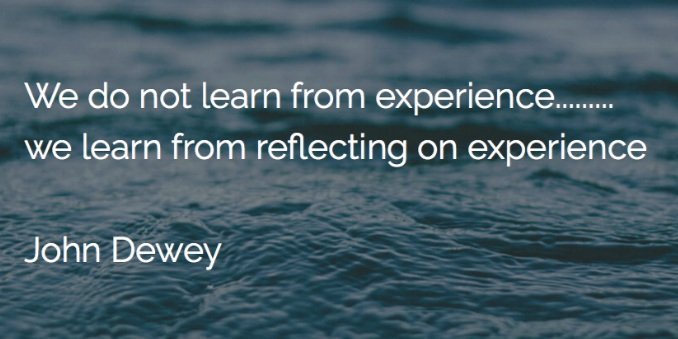Getting started with reflection as a healthcare leader.
Taking advantage of a series of facilitated sessions led by Don McVeigh allowed me to focus on reflection. I got to meet new people, and together, we worked through a series of questions that Don had posed, focusing firstly on me and where I'm at and then on my team and the people I influence.
I'm not a stranger to the power and purpose of reflection and am pretty clear on the best style and way for me to get the most out of reflection. These sessions gave me a new lens and focus.
Firstly, the facilitation. Having a guide to lead me through focuses the time and the structure, asking different and new questions that tap into new ways of thinking.
Secondly, committing and sticking with it. These were booked sessions; which meant allocating the time in my calendar. How many times have I set aside some calendar time to do something specific but it gets chewed away, or completely disappears? For some reason, the structure of these sessions holds me to account and I turn up and tune in.
Having benefited from this myself over a couple of weeks, of course, I tested it out with a team I've been working with.
Booked a short amount of time
Clarified the purpose and the benefit
Used a series of reflective questions together.
What have been the benefits and value in committing to this time of reflection - when to be honest the to-do list wasn’t getting any shorter for any of us.
Staying motivated
Leadership is great and tough, staying motivated while managing the tensions, pressures and performance of your team can lead to exhaustion. This article from HBR describes this challenge and a study that found taking a few minutes in the morning to reflect intentionally and positively about your leadership attributes and contributions made a difference to the energy and engagement during the day ahead.
Keep learning and developing - doing better
One study is often mentioned in a number of articles on reflection and summed up clearly in Caroline Webb's book How to Have a Good Day (a book I am destined to never finish but keep dipping into). The findings point to the fact that we don't get better at something simply by having more practice. We improve when we step away and allow our brains to process the learning. The testing in practice of this principle found that in 15 minutes a day, there was a 23% improvement in performance. So for a small amount of time, there was a big boost in output.
Impact
In another article from HBR 'How to regain the lost art of reflection,', different well-known leaders’ practices are described. Not only how they prioritise the time and role model the practice, it also describes the impact this focus had on their companies. And while in the main I'm writing about self-reflection, the need to stop and reflect as a team, as an organisation is imperative to remain relevant and figure out why and what you're about. I would say that a stop check now with all that is occurring in the world should be on your priority list as this article would argue for - it's a strategic imperative.
How to get started with reflection
There are several suggestions out there on how to turn the concept of reflection into something practical. The consistent theme from all I've read is that you have to find what matches your style, way of learning and how you get the best insights from yourself. This means you need some level of self-awareness to start with. Or, test and try and see what works - learn as you go.
Try these questions for an initial insight into your reflective style. Try one method, if that doesn't quite do it for you, don't decide reflection isn't for you - try another method. Most of what I've learnt suggests having a series of questions or prompts as a guide. What I've enjoyed and gained from the Jumpshift sessions is that the questions are different every time, so they keep me on my toes and I don't fall into the trap of thinking I know the answers or finding it repetitive or boring.
This article from Forbes begins with why reflection is important and then explores and describes some of the ways you could approach it. It might be that taking a walk with your thoughts does it, or sitting quietly on your own, or you might like to use questions. It can have a methodical and structured design and approach or a more free-flowing and creative one. One size does not fit all and who's to decide that you can't mix it up and use a combination? For a structured methodical approach take a look at Gibb’s reflective cycle.
Another example from How to Have a Good Day was using 'DATE' as a series of prompts.
D - Discovered - a lesson learned or something you'd do differently
A - Achieved - work done, the challenges faced, a small step
T - Thankful for - gratitude and acknowledging the positive in the day
E - Experienced - maybe something new, or an emotion to explore
Leading leaders?
Creating the time, establishing the habit, and the space for regular reflection is one of the most powerful role-modelling and culture-setting actions you can take. I’ve been running an online reflection series for groups and teams in several clinical settings. These short sessions are described as
The only time I have to pause and get some headspace on all that I’m juggling.
A time to breathe and recall the wins I’ve had and the progress I’ve made.
Encouraging and keeping me going
If you’d like to know more about establishing these for your team, and demonstrating how you value their contribution and development, let’s talk.


